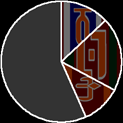The Fleet (TRS)
More languages
More actions
- This article involves the fleet of faster-than-light-capable civilian ships in the Re-imagined Series. For information on its sublight counterpart in the Original Series, see The Fleet (TOS). For general information on other articles pertaining to fleets, see: Fleet (disambiguation).
The Fleet is a convoy of ships sheltering the human survivors of the Cylon attack. The Fleet forms the backdrop of the drama of the Re-imagined Series.

Overview
"The Fleet" originates as a convoy of about 60 commercial and civilian ships in the space surrounding Caprica. Laura Roslin - with the aid of Sharon Valerii - initiates the clustering of stranded vessels in the aftermath of the Cylon invasion of the Twelve Colonies, thus forming the convoy. Twenty of these ships are abandoned to a squadron of attacking Raiders because they either lack FTL drives, or are damaged, like Gemenon Liner 1701. The remaining vessels join battlestar Galactica - the only Colonial warship known to have survived the Cylon attack - in the upper atmosphere of the gas giant Ragnar. From here on, Galactica shoulders the role of the Fleet's protector (Miniseries).
Anastasia Dualla explains in "33" that 53 ships have jumped away from an attacking Cylon baseship, with 10 still reporting trouble with their FTL drives. Adding Galactica to this tally, results in a total number of 64 ships. Saul Tigh's statement in "The Farm" that the 24 ships departing with the Laura Roslin faction represent "almost a third of the fleet", implies that the number of ships in the Fleet is approximately in the mid-70's. By "The Passage", there are likely fewer ships left in the Fleet because of the Cloud Nine destruction (Lay Down Your Burdens, Part II) and the settlement and emergency exodus of New Caprica (Exodus, Part II).
The political and social troubles befalling the Fleet as it wanders through space, serve as a metaphor for all of humanity, since the Fleet literally is what is left of humanity in the television series.
The phrase "the Fleet" functions not only as a signifier for the actual ships of the convoy, but as an indicator of the people on board, and therefore for mankind. Often the term is used to refer to the civilian populations, as opposed to the military personnel of Galactica and Pegasus. Usage of the term "the Fleet" has not gained more than an informal acceptance, as can be seen by President Roslin's continued use of the term President of the Twelve Colonies. This may be interpreted either as an expression of hope that the people of the Fleet will re-establish themselves on a new world, or a psychological inability to accept the Fleet as the only home that humanity will know for a long time.
After several years of searching the Fleet eventually reaches Earth, but finds it to be a nuclear wasteland (Revelations).
Ships
- Colonial ships use launch keys to activate the ship's systems (Precipice). The keys are unique to each vessel and are extremely difficult to copy.
Remaining
Seen
Mentioned only
Unless otherwise mentioned, the following ships are only listed on the voting tally board in "Lay Down Your Burdens, Part II". However, many of the ship names are also used in later episodes, both for mentioned-only and seen ships. As such, it is clear that the writers have a list of the ships to pick names from and don't just make up new ones.
- An unnamed Gemenon Liners passenger cruiser (33).
- An unnamed Pan Galactic spaceliner (Miniseries, "Exodus, Part II", "The Passage").
Additional ships
- At least six Colonial Movers heavy transport ships, at least three of which are among the remaining ships of the Fleet (Crossroads, Part II).
- At least four mining ships remain, including Monarch (Crossroads, Part II).
- At least four Kimba Huta-type transports throughout the Fleet, at least three remain after New Caprica.
Seen but unnamed
- Five-engined vessel, seen above Caprica City (Miniseries) and during the escape from New Caprica (Lay Down Your Burdens, Part II)
- Wedge-shaped vessel, seen briefly during the end of "Lay Down Your Burdens, Part II"
- Tubed vessel, seen throughout the Fleet and jumping away from New Caprica at the end of "Lay Down Your Burdens, Part II"
- Rising Star type vessel, seen briefly in "Escape Velocity".
- Note: Any of these vessels is probably identical to one of the mentioned only ones above.
Destroyed
Additional ships
- The following ships are destroyed together in the Cloud Nine disaster (Lay Down Your Burdens, Part II):
- One Colonial Movers ship
- A yellow vessel
- A long-necked vessel
Demographics
A few points of information are available concerning the demographics of the Fleet. In "33", before the destruction of the Olympic Carrier, there are 5,251 survivors from Sagittaron and 49,998 total survivors. In "Home, Part I", the Laura Roslin faction leaves the Fleet with 18,000 individuals, of which 9,500 ware Gemenese and 6,250 were Capricans. At that time the total population of the Fleet is 47,857.
This information is sparse, but it gives a general idea of the population breakdown of the Fleet if a few assumptions are made for the sake of argument.
- Note that Gemenon and Caprica have more citizens in the Roslin faction alone than Sagittaron has in the entire Fleet. The Twelve Colonies are clearly not represented in equal proportion.
- Before the destruction of the Olympic Carrier, Sagittaron natives make up 10.50% of the Fleet. Solely for the purpose of argument, it is assumed that the Olympic Carrier's population breakdown was identical to the rest of the Fleet's and that Sagittaron continues to make up 10.50% of the Fleet's total population.
- The figures from the Roslin faction can be interpreted in several ways:
- ASSUMPTION 1: All Gemenese and Capricans jump to Kobol with the Roslin faction.
- Caprica: 6,250 persons (13%)
- Gemenon: 9,500 persons (20%)
- Sagittaron: 5,026 persons (11%)
- Others: 27,081 (57%)
- ASSUMPTION 2: All Gemenese jump to Kobol with the Roslin faction, lured by the "religion card", but the Caprican portion of the Roslin faction is representative of the Fleet.
- Caprica: 28,204 persons (59%)
- Gemenon: 9,500 persons (20%)
- Sagittaron: 5,026 persons (11%)
- Others: 5,127 persons (11%)
- ASSUMPTION 3: Caprican and Gemenese portions of the Roslin faction are representative of the Fleet.
- Caprica: 16,617 persons (35%)
- Gemenon: 25,258 persons (53%)
- Sagittaron: 5,026 persons (11%)
- Others: 956 (2%)
- Although it is plausible that the Caprican population is substantially larger than the other Colonies, as Colonial Heavy 798 is in the vicinity when the attack begins, and is the nucleus around which the Fleet rallies, it is unlikely that the populations of each colony are grossly unequal, or else the Quorum of Twelve would be a very poor system of government. The likeliest scenario is therefore somewhere in between assumptions 1 and 2, with nearly all of the Gemenon population (drawn by the "religion card") and a large portion of the Caprican population leaving with Roslin.
- Alternatively, it is possible that the population of the Colonies are grossly unequal. Although the structure of the Quorum of Twelve appears to maintain at least a fiction that the Colonies are roughly equal, next to nothing is known about how the governmental system of the Colonies was established or how it evolved over time. Indeed, the United States Senate, for example, by design expressly assumes that the various states constituting it are 'equal' even though this is clearly not the case in terms of their respective populations. Furthermore, the fact that a system of government is 'poor' or else not representatively proportional does not mean it cannot actually be implemented and even survive for long periods of time.
As for the population distribution, the population of several ships is known: Galactica (2,693 as of "Water"), the Olympic Carrier (1,345 as of "33"), Astral Queen (1,500 as of "Bastille Day", retconned up from 500 in the Miniseries) and Pyxis (600 when destroyed in "He That Believeth In Me"). There are 176 civilians in the cargo hold of Colonial One in "Kobol's Last Gleaming, Part II". The Fleet is stated at about 75 ships in "Resistance", retconned up from 40 in the Miniseries.
- Going by the 75 ship count, the remaining ships besides Galactica and the Astral Queen each carry about 600 persons on average.
- The 23 ships that leave with the Laura Roslin faction, apart from the Astral Queen, would have an average population of about 720 persons per ship.
The Fleet's population has declined by about 8,000 since the above.
Notes
- Unofficially, many viewers refer to the Fleet as the "RTF"; "Rag Tag Fleet", or more fully, "RTFF." These nicknames come from the term "Rag Tag Fugitive Fleet," a name used in the opening credits voice over of the Original Series (performed by series creator Lorne Greene), describing the civilian refugee fleet.
- In the Miniseries, astute viewers may recognize three spacecraft with notable resemblances of ships from other SF universes. The first two of these ships aren't considered a canonical part of the series or the Fleet, but their appearance adds a bit of humor and pays homage to other notable science fiction and their creative staff.
- Serenity, the central ship from the TV series Firefly and the motion picture Serenity, appears briefly in the sky outside the window of a doctor's office where viewers first see Laura Roslin. The ship does not appear in the Fleet.
- The original USS Enterprise (NCC-1701) from the original Star Trek TV series makes a cameo in the last shot of the Fleet as Elosha chants a prayer in the memorial service near the end of the Miniseries. Look to the upper right corner for the ship in a still frame. All Season 1 opening credits use this shot, so Enterprise makes a very quick appearance with each of the first 13 episodes (This is best viewed from the Season 1 DVD set).
- The ill-fated Botanical Cruiser in the Miniseries was added in homage to the Agro Ship from the Original Series, which in turn were the re-used models from the SF film Silent Running, a Universal/MCA movie that special effects guru John Dykstra worked on a few years prior. At least one FTL-capable version of this ship survives and exists in the Fleet (The Passage).



